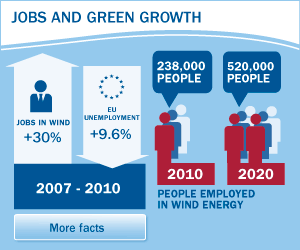ETS backloading cautiously welcomed as first step towards reviving carbon market
On their second time around, European MEP’s yesterday voted in favour of ‘backloading’. This means that the number of permits to pollute released under the Emissions Trading System (ETS) will be temporarily reduced by 900 million tonnes of carbon. This will increase the cost of carbon to industry and create an incentive to pollute less. The vote will also “build confidence in the ETS” said Rémi Gruet, the European Wind Energy Association’s (EWEA) Senior Regulatory Affairs Advisor.
The cost of carbon to polluters recently slumped to an all-time low, threatening the relevance of the world’s biggest carbon market. Prices had lost more than 70% in the past four years. Worsened by the economic crisis, the over-supply of permits reached 2 billion metric tonnes in 2012, equal to the EU’s annual limit imposed on 12,000 power plants and factories.
Several interpretations of the vote were evident in the international media. Bloomberg, calling the over-supply of permits a “glut”, quoted a banker at Commerzbank AG in London who said “Markets are hoping on a fast-track decision to regain confidence in the EU emissions trading scheme. We would expect that prices are capped in the mid-term around 6 euros on the back of uncertainties on the European economy, supply from industrials and auctioning.” The price had slumped to a record low of 2.46 euros on April 17, the day after the EU Parliament rejected backloading on its first vote. Policymakers say a higher price is essential to encourage more greenhouse gas reductions across Europe’s industry, with the Guardian quoting a figure of prices above €20 per tonne “needed to give utilities sufficient incentive to make serious switches to lower carbon energy generation”.
Rémi Gruet of EWEA echoed this desire for a fast decision, saying that “It is crucial that the EU Member States now agree backloading as soon as possible”. Gruet added that “the European Commission should propose a 2030 Climate and Energy Package, with headline renewable and GHG reduction targets, without delay.”
Climate Action Network (CAN) Europe and WWF hailed the vote as the first step towards increasing overall EU climate action, which had been in jeopardy. Julia Michalak of CAN Europe said “Today the European Parliament used its second chance to get back-loading right. By approving back-loading and rejecting several dangerous loopholes that had been proposed as part of a compromise, they’ve paved the way for the necessary deep reform of the EU ETS. Member States must start to negotiate the final outcome as soon as possible – we have lost enough time already.”
CAN Europe and WWF published their 2014 edition of the Future Times to indicate what they foresee if Member States support the backloading amendment.
Others were not as positive on the vote. Greenpeace’s Joris den Blanken said: “The Parliament unexpectedly rejected a further weakening of the plan, but there is still not too much to celebrate. As soon as the suspended allowances are allowed to re-enter the system, the carbon market will be back to square one.” He said 2.2bn allowances must be cancelled before 2020 to restore the credibility of the ETS.







